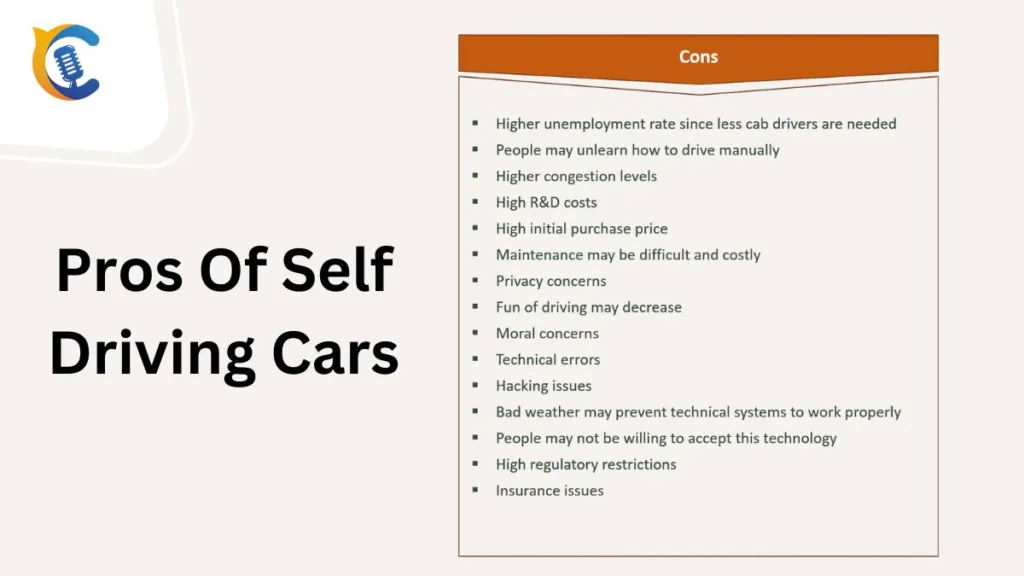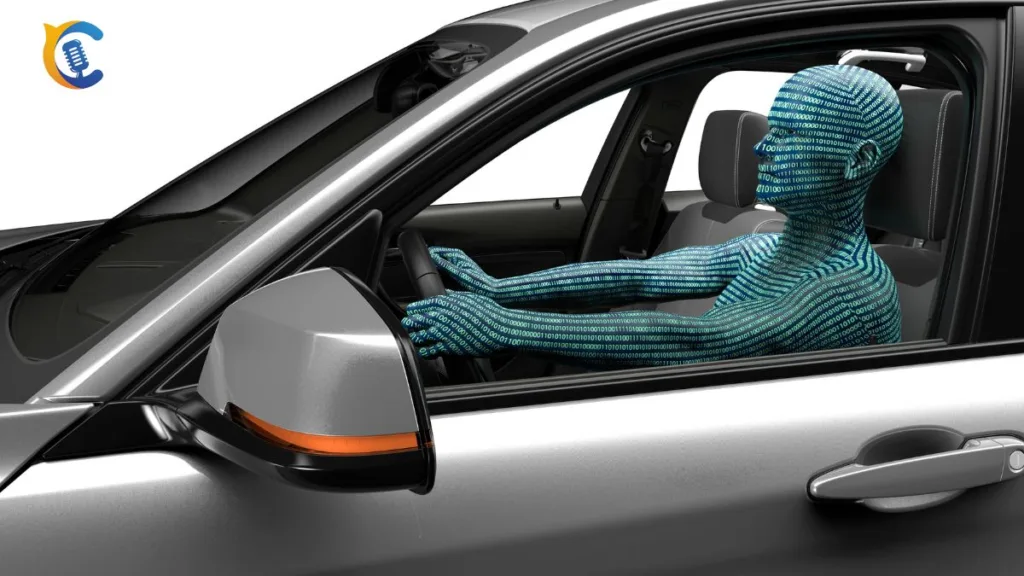Pros and Cons of Self-Driving Cars / Self-Driving Cars in the United States / Pros and Cons / Self-Driving Cars
Table of Contents
Introduction:
Self-driving cars, once considered a distant future, are now becoming a reality in the United States. With the advancements in autonomous vehicle technology, the potential benefits and drawbacks of self-driving cars have become prominent topics of discussion. This blog aims to explore the pros and cons of self-driving cars, shedding light on their impact on road safety, traffic congestion, accessibility, fuel efficiency, time savings, insurance costs, technological challenges, job displacement, ethical dilemmas, initial costs, regulatory hurdles, and cybersecurity risks.
(Pros and Cons of Self-Driving Cars)
Pros of Self-Driving Cars:
- Increased Road Safety:
One of the most compelling arguments in favor of self-driving cars is their potential to revolutionize road safety. Human error is the leading cause of accidents on the roads, and autonomous vehicles can significantly reduce the likelihood of such incidents. Self-driving cars rely on advanced sensors, cameras, and artificial intelligence algorithms to make split-second decisions, avoiding collisions and adhering to traffic rules with greater precision than humans. With fewer accidents, the roads become safer for all users, including pedestrians and cyclists.

- Reduced Traffic Congestion:
Autonomous vehicles have the capability to optimize traffic flow through real-time data analysis and communication between vehicles. By coordinating speed, lane changes, and intersections more efficiently, self-driving cars can alleviate traffic congestion and reduce the time commuters spend stuck in gridlock. This optimization can lead to smoother and more efficient transportation, ultimately benefiting the environment by reducing overall fuel consumption and emissions.
- Improved Accessibility:
Self-driving cars hold immense promise in addressing accessibility challenges faced by people with disabilities or limited access to transportation options. For those unable to drive due to physical or cognitive limitations, autonomous vehicles offer a newfound sense of independence and mobility. Moreover, self-driving cars can cater to the elderly population, providing them with a safe and reliable means of transportation, thus enhancing their quality of life.
- Fuel Efficiency:
Autonomous driving systems can optimize driving patterns and routes, leading to improved fuel efficiency. As self-driving cars can maintain consistent speeds and anticipate traffic patterns, they can help reduce fuel consumption and greenhouse gas emissions. This potential for lower carbon footprints aligns with the broader goal of combating climate change and transitioning to a more sustainable transportation system.
- Time Savings:
Self-driving cars have the potential to transform the daily commute from a time-consuming chore into a productive or leisurely experience. With the car handling the driving tasks, passengers can reclaim travel time, making it possible to work, read, relax, or engage in other activities during their journeys. This time-saving aspect can have a positive impact on individuals’ work-life balance and overall well-being.
- Potential for Reduced Insurance Costs:
The increased safety brought about by self-driving cars could result in fewer accidents on the roads. As a consequence, insurance companies may offer lower premiums for self-driving car owners, incentivizing the adoption of autonomous vehicles and potentially reducing the financial burden on consumers.

Cons of Self-Driving Cars:
- Technological Challenges:
The development of robust and fail-safe self-driving systems is a complex task. Despite significant advancements, potential software glitches or hardware failures still pose safety concerns. The need for extensive testing and validation of autonomous technology is essential to ensure that self-driving cars perform reliably under various conditions.
- Job Displacement:
The widespread adoption of self-driving cars could lead to job losses for drivers in various industries, such as trucking and ride-hailing services. While autonomous vehicles may create new job opportunities in technology and maintenance sectors, the transition could be challenging for displaced workers, necessitating efforts to reskill and retrain the workforce.

- Ethical Dilemmas:
Programming self-driving cars to make life-and-death decisions in the event of unavoidable accidents raises complex ethical questions. For instance, in situations where accidents are inevitable, should the car prioritize the safety of its occupants, pedestrians, or other drivers? Resolving these ethical dilemmas requires a thoughtful and transparent approach involving society, policymakers, and industry stakeholders.
- Initial Costs:
Self-driving cars currently carry high manufacturing and maintenance costs, making them relatively expensive for the average consumer. As the technology matures and becomes more widespread, the costs are likely to decrease, but the affordability factor remains a concern for early adopters.
- Regulatory Hurdles:
The deployment of self-driving cars requires comprehensive regulations to address various legal and liability issues. Policymakers must establish clear guidelines concerning safety standards, data privacy, insurance responsibilities, and the integration of autonomous vehicles into existing transportation infrastructure. Developing a regulatory framework that fosters innovation while ensuring public safety is a complex task.
- Cybersecurity Risks:
As with any connected technology, self-driving cars are susceptible to cybersecurity threats. Hackers may attempt to exploit vulnerabilities in autonomous vehicle systems, potentially jeopardizing user safety and privacy. The automotive industry and technology developers must prioritize cybersecurity measures to safeguard against potential attacks and maintain public trust in self-driving technology.
Embracing a Future with Self-Driving Cars:
Despite the potential challenges, it is essential to remember that every transformative technology goes through a period of adaptation and refinement. Self-driving cars have the capacity to revolutionize transportation, enhance road safety, and create more sustainable and accessible mobility solutions. As we move forward, it is crucial to address the cons and work towards maximizing the pros to fully realize the benefits of self-driving cars.

- Collaboration and Research:
To overcome technological challenges and ensure the safety and reliability of self-driving cars, collaboration among automotive companies, technology developers, and research institutions is vital. Continued investment in research and development will lead to more advanced and fail-safe autonomous systems. Rigorous testing, both in controlled environments and real-world scenarios, will be crucial to identifying and rectifying any flaws or vulnerabilities in the technology.
- Workforce Transition and Reskilling:
The potential job displacement caused by self-driving cars calls for proactive measures to support the affected workforce. Governments and industries must work together to implement retraining and reskilling programs to equip displaced workers with the skills needed for emerging job opportunities in the autonomous vehicle industry and other sectors. By fostering a smooth transition, we can mitigate the negative impact on individuals and communities.
- Ethical Frameworks:
The ethical dilemmas surrounding self-driving cars demand transparent and inclusive discussions involving ethicists, policymakers, and the public. Creating clear ethical frameworks for autonomous vehicles will guide developers in programming their systems to make morally sound decisions in challenging situations. This approach ensures that the safety of all road users is considered without undue bias.
- Affordability and Incentives:
Addressing the initial costs of self-driving cars requires innovative approaches. Governments can consider providing incentives, such as tax breaks or subsidies, to promote the adoption of autonomous vehicles, particularly among individuals and businesses that prioritize environmental sustainability and road safety. As the technology matures, economies of scale and advancements in manufacturing processes will naturally drive down the costs of self-driving cars.
- Regulatory Clarity:
Developing comprehensive and forward-thinking regulations is paramount to facilitate the safe integration of self-driving cars into existing transportation infrastructure. Policymakers must collaborate with industry experts to establish clear guidelines that address liability, insurance, data privacy, and cybersecurity. Striking the right balance between encouraging innovation and safeguarding public interests will be a significant challenge.
- Cybersecurity Focus:
Recognizing the potential cybersecurity risks associated with self-driving cars, manufacturers and technology developers must make cybersecurity a top priority. Regular audits, continuous monitoring, and robust encryption protocols can help protect autonomous vehicle systems from potential cyber-attacks. Additionally, fostering a culture of transparency in disclosing and addressing vulnerabilities will build consumer confidence in the technology.
Conclusion
The advent of self-driving cars represents a transformative leap in the world of transportation. Embracing this technological advancement requires a holistic approach that addresses the pros and cons with careful consideration. While the advantages of increased road safety, reduced traffic congestion, improved accessibility, fuel efficiency, and time savings are undoubtedly enticing, we must not overlook the potential challenges related to technology, workforce displacement, ethics, affordability, regulation, and cybersecurity.
As we venture into a future with self-driving cars, it is essential to embrace collaboration, research, and innovation to overcome these challenges. Policymakers, industries, researchers, and society at large must come together to shape a responsible and sustainable path for autonomous vehicles. By doing so, we can create a transportation landscape that prioritizes safety, efficiency, inclusivity, and environmental consciousness, making self-driving cars a true game-changer for the United States and beyond.
Ultimately, the successful integration of self-driving cars will depend on our ability to adapt, learn, and innovate. By leveraging the immense potential of autonomous vehicles while actively addressing the associated challenges, we can steer towards a future where self-driving cars revolutionize transportation and make our roads safer and more accessible for everyone.
Pros of Self-Driving Cars in the United States:
- Increased road safety: Self-driving cars have the potential to reduce human error, the leading cause of accidents, making roads safer for all users.
- Reduced traffic congestion: Autonomous vehicles can optimize traffic flow, leading to smoother and more efficient transportation.
- Improved accessibility: Self-driving cars can offer mobility solutions for people with disabilities or limited access to transportation.
- Fuel efficiency: Autonomous driving systems can optimize fuel consumption, leading to reduced emissions and environmental benefits.
- Time savings: Passengers can reclaim travel time, working, or relaxing during their journeys.
- Potential for reduced insurance costs: Fewer accidents may result in lower insurance premiums.
Cons of Self-Driving Cars in the United States:
- Technological challenges: Developing robust, fail-safe systems is complex, and potential software glitches or hardware failures raise safety concerns.
- Job displacement: Widespread adoption of self-driving cars could lead to job losses for drivers in industries like trucking and ride-hailing.
- Ethical dilemmas: Programming vehicles to make life-and-death decisions raises ethical questions about accident prioritization.
- Initial costs: Self-driving cars can be expensive to manufacture and maintain, limiting affordability for some consumers.
- Regulatory hurdles: Developing comprehensive regulations and addressing liability issues remain significant challenges for the deployment of autonomous vehicles.
- Cybersecurity risks: Hackers may attempt to exploit vulnerabilities in self-driving car systems, potentially compromising user safety and privacy.



































1 thought on “Pros and Cons of Self-Driving Cars in the United States: A Comprehensive Analysis 2023”